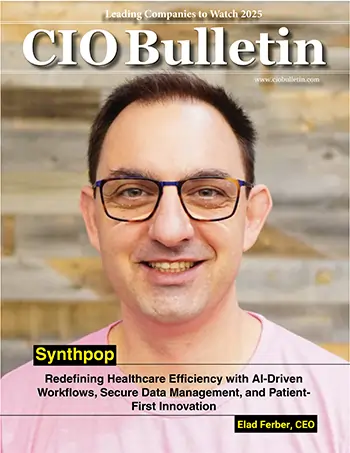50 Innovators of the Year 2022
CIO Bulletin
-demas-phd-ceo.jpg)
Among the most noteworthy developments in ophthalmology over the last decade has been the emergence of quantifiable high-resolution imaging modalities, which are typically non-invasive, rapid and widely available. Such imaging is of unquestionable utility in the assessment of ocular disease however evidence is also mounting for its role in identifying ocular biomarkers of systemic disease, which is called oculomics. The use of image analytics tools developed by the tech industry is becoming more widespread in the healthcare space. By peering into the eye with a camera and an algorithm, recent studies and advances in AI have enabled accurate prediction of numerous conditions, such as neurological and cardiovascular risk. Given the growing size and complexity of emerging multimodal datasets, modern artificial intelligence techniques, such as deep learning, may provide the optimal opportunity to further characterize these associations, enhance our understanding of eye-body relationships and secure novel scalable approaches to the risk stratification of chronic complex disorders of ageing.
Tesseract Health is one such company whose mission is to democratize healthcare and improve lives using the wealth of health information in the human eye. Tesseract knows that the best way to predict the future is to make it, and that the retina will be the new noninvasive diagnostic platform of the 21st century. This future will be made possible by Tesseract Health and its innovative Tesseract iC platform incorporating novel multidimensional sensors and artificial intelligence. Tesseract Health is part of 4Catalyzer, a rapidly growing health technology accelerator with offices in CT, NY, CA, and Taiwan, and offices opening soon in Miami, Boston, and San Diego.
Why Tesseract Health
Tesseract is in good company being part of the 4Catalyzer incubator. Two of its startups — Butterfly Network, which makes a pocket-sized ultrasound machine, and Quantum-Si, which is developing a protein-sequencing platform that promises to lead to better ways to diagnose and treat cancer and other diseases — recently went public after merging with special purpose acquisition companies, or SPACs.
Tesseract Health hopes to use novel multidimensional sensors and artificial intelligence to take an “eye selfie,” allowing doctors to peer into the back of the eye so they can better detect Alzheimer’s, MS, diabetes and even cancer, all from the retina. Tesseract has also gotten the attention of investors. The company recently raised $80 million in an oversubscribed series B financing round from Foresite Capital, Glenview Capital and Opaleye, among other financiers. The funds will be used to advance the company’s technology, pursue regulatory clearances and prepare for commercial launch. Tesseract is still in the development stages, conducting studies and preparing its application for U.S. Food and Drug Administration review. The hope is to begin selling its product next year, pending regulatory approval, Rosenthal said.
The Tesseract iC Platform: Democratizing Healthcare
It is intended to diagnose a wide range of diseases without drawing blood. The platform includes a novel chemical sensor and combined multiple dimensions of imaging technology and AI to image the retina, which is the only part of the human body where it is possible to directly see arteries, veins, capillaries, and nerves. The Tesseract iC platform is a binocular eye imaging device that is portable, affordable, and operable by anyone, supporting a post COVID world focused on cloud-connected telemedicine. Tesseract plans to usher in a new branch of diagnostics fusing the best of imaging and laboratory medicine, a truly world’s first to support screening, diagnosis, monitoring and treatment in a number of clinical domains to go well beyond ophthalmology to primary care, cardiology, neurology, and more. If its product gains regulatory approval, Tesseract anticipates initially selling its technology to primary care physicians, ophthalmologists and optometry practices. Future customers could include cardiologists, neurologists, emergency medicine doctors and hospitalists.
The Stalwart at the Helm of Tesseract Health
Vasiliki (Vicky) Demas, PhD is the Chief Executive Officer of Tesseract Health. She has more than 20 years' experience in building teams, developing and launching healthcare products, establishing and managing diverse program portfolios. Prior to joining Tesseract, Vicky led the development of new products at the cancer screening company GRAIL, where she also managed the scientific and technology portfolio and led a cross functional competitive intelligence program. She supported the development of the core platform technology which formed the basis of the company’s first multi cancer early detection test (Galleri), and she led GRAIL’s post-diagnostic efforts. She currently holds over 20 patents and has authored and co-authored numerous publications across multiple disciplines. She holds a Ph.D. in Chemical Engineering from the University of California, Berkeley and completed a postdoctoral fellowship at Lawrence Berkeley and Livermore National Labs.







